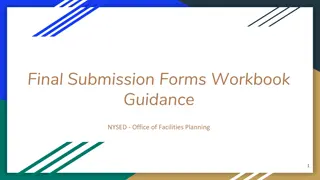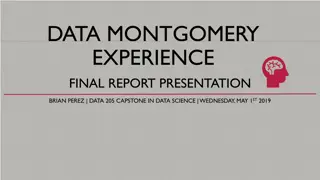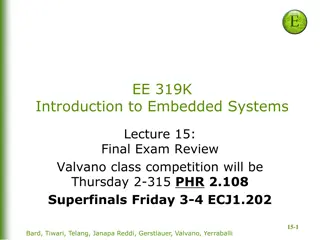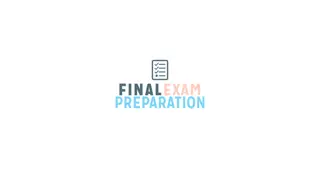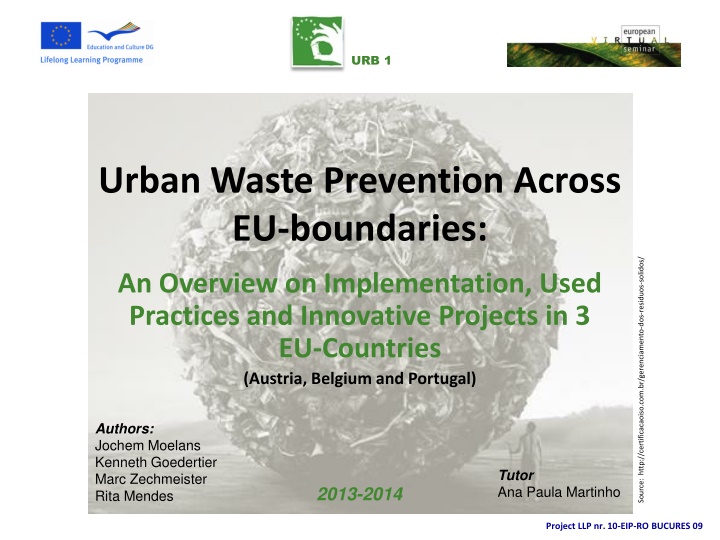
Urban Waste Prevention Initiatives in EU Countries
Explore the implementation, practices, and innovative projects for urban waste prevention across Austria, Belgium, and Portugal as per the EU Waste Directive 2008/98/EC. Learn about the challenges, best practices, stakeholder involvement, and potential innovative solutions for promoting sustainable development through waste prevention.
Download Presentation

Please find below an Image/Link to download the presentation.
The content on the website is provided AS IS for your information and personal use only. It may not be sold, licensed, or shared on other websites without obtaining consent from the author. If you encounter any issues during the download, it is possible that the publisher has removed the file from their server.
You are allowed to download the files provided on this website for personal or commercial use, subject to the condition that they are used lawfully. All files are the property of their respective owners.
The content on the website is provided AS IS for your information and personal use only. It may not be sold, licensed, or shared on other websites without obtaining consent from the author.
E N D
Presentation Transcript
URB 1 Urban Waste Prevention Across EU-boundaries: Source: http://certificacaoiso.com.br/gerenciamento-dos-residuos-solidos/ An Overview on Implementation, Used Practices and Innovative Projects in 3 EU-Countries (Austria, Belgium and Portugal) Authors: Jochem Moelans Kenneth Goedertier Marc Zechmeister Rita Mendes Tutor Ana Paula Martinho 2013-2014 Project LLP nr. 10-EIP-RO BUCURES 09
URB 1 Waste Prevention Research - State of the Art Waste prevention initiatives, although on top of the EU waste management hierarchy, are not overly successful thus far. It is hard to measure prevention, but monitoring, evaluation and life-cycle assessments are important tools in waste management. Research shows that substantial reduction of material expenditures is possible in some industries without additional innovations and investments. Food waste probably has the greatest prevention potential. Behaviour changes, communication (e.g. for sharing concepts) and coordination between projects and stakeholders are key for effective waste prevention. Eventually, rethinking our consummation patterns and reducing consumption might be the most important effective measures for waste prevention. Project LLP nr. 10-EIP-RO BUCURES 09
URB 1 Central research question? What is the contribution of the European Union Waste Directive 2008/98/EC, concerning household waste, in 3 EU-countries (Austria, Belgium and Portugal) in promoting urban waste prevention and thereby promoting sustainable development? The specific objectives (find): which measures are being taken in order to implement EU Waste Directive and what circumstances are causing problems; which best practices are being applied and which waste streams can be taken into consideration on having the highest potential on prevention of (MSW); which actions are being taken, concerning stakeholders behaviour, to promote best practices at individual, local, national and European levels; which innovative practices have potential for implementation in urban waste prevention; if the practices in use are appropriate to decouple waste production and economic growth. Project LLP nr. 10-EIP-RO BUCURES 09
URB 1 Methodology The research methodology implied analysis of (European, national and regional levels): LEGISLATION: - Legislation concerning waste management and specifically waste prevention; - Official government Waste Prevention Plans and Reports; - Articles analysing implementation. TECHNOLOGY and INNOVATION: - Scientific, unscientific articles and non-academic literature; - Web-pages on Internet - innovative projects on going with good and enlargeable results. SOCIOLOGY: - Simple measures related with Waste Prevention at individual and local level. ECONOMY: - Scientific literature and newspapers articles - waste prevention is improving/harming economy? Project LLP nr. 10-EIP-RO BUCURES 09
URB 1 Results Flanders Organic Waste (OVAM, 2013) Food waste (GFT) in 2012: 42,75 kg/resident/year (= 8,33% of total MSW) Since the 90 s strong increase of food waste (GFT) Decline since 2000 because food waste became paying per kg (big growth of home composting) Relative decoupling of food waste and economic growth since 2000 Project LLP nr. 10-EIP-RO BUCURES 09
URB 1 Results Flanders Packaging Waste (Fost Plus, 2013) Packaging waste in 2012: 116,6 kg/resident (= 21,75% of total MSW) Decline for first time in all packaging waste fractions in 2012 93% of packaging is recycled at the end of its life cycle Relative decoupling of packaging waste and economic growth since 2003 Project LLP nr. 10-EIP-RO BUCURES 09
URB 1 Results Portugal Organic Waste Yearly increase in organic waste until 2010 Reduction for the first time in organic waste in 2011 (~ 255 kg/resident/year) PERSUS II goal in 2016 needs a further reduction of ~ 50% Project LLP nr. 10-EIP-RO BUCURES 09
URB 1 Results Portugal Packaging Waste Increase in packaging waste until 2010 Reduction for the first time in 2011 PERSUS II goal in 2016 needs a further waste reduction of ~20% Project LLP nr. 10-EIP-RO BUCURES 09
URB 1 Results Austria Packaging Waste & Food (Eurostat, 2013) Scarce reliable data of food waste: estimation of 97.500 ton (2009) Amount of packaging waste increased little between 2002-2011 Recycling rate packaging waste of ~45% Project LLP nr. 10-EIP-RO BUCURES 09
URB 1 Innovative projects Projects that bring together various new ideas in a way that they have an impact on society. Zero Desperd cio (Portugal) zero waste Reduce food waste and distribute food to people with needs Food that is reaching expiry date and can t be sold anymore Served more than 702 000 meals Bicycle (Austria) Bicycle repairing Old and damaged bicycles not thrown away and replaced Bulky waste Government sponsored business Employment for disadvantaged adolescents and long time unemployed people Waste reducing, pollution reducing and social project! Project LLP nr. 10-EIP-RO BUCURES 09
URB 1 Innovative projects MOS-project (Belgium) Helps schools on a pedagogical responsible way build up an environmental care system Kindergarten secondary schools 5 themes: Waste, Energy, Nature, Mobility, Water Actions and measures to make the school more environmental friendly Schools can obtain a quality logo indicates which level the school is environmental friendly Checkpack (Belgium) Intelligent packaging Real-time information about quality of the food or/and packaging integrity Optical sensor provides information for producer, distributor and consumer Allows us to consume food after theoretical expiration date preventing food waste Project LLP nr. 10-EIP-RO BUCURES 09
URB 1 Waste Prevention Tips Back-to-school Many of last year's supplies can be reused or recycled Share your used books with friends, relatives, or younger schoolchildren Purchase and use a wide assortment of supplies made from recycled products Cover your textbooks with cut-up grocery or shopping bags helps reduce waste and keeps your books in good condition If you bring your lunch to school, package it in reusable containers instead of disposable ones Community projects Organize a recycling drive in your neighbourhood or school When going to work or school, try carpooling, biking, walking, or riding public transportation to reduce pollution Organize a green waste diversion and composting program for your neighbourhood Hold a "donation picnic" where the members of your community can have lunch, talk, and bring their old toys, clothes, books, furniture, and other items for reuse by charitable organizations Project LLP nr. 10-EIP-RO BUCURES 09
URB 1 Conclusions Waste data is not always completely reliable and often not perfectly comparable conclusions have to be drawn carefully; Goals of the EU directive have partly been met due to measures taken by member states, but there still is a lot room for improvement, especially in prevention; Economically successful countries in general show very high percentage of recycling and low percentage of landfilling, but still very high amounts of MSW production; There exist big differences between individual countries but also smaller regions; The countries and regions could learn a lot from each other by looking at best practices in other countries, exemplary regions as well as economically, socially and geographically similar countries; Austria can be a model for recycling (highest recycling rates in Europe); Belgium shows very good numbers in recycling too, but also produces substantially less MSW than Austria and the EU average; Portugal shows improvements in some fields and can therefore be a model for lesser developed countries. Project LLP nr. 10-EIP-RO BUCURES 09
URB 1 Recommendations for the EU, local authorities and stakeholders: Informative and educational measures (information campaigns, ) to improve the awareness for waste prevention, separation and consequences of waste, as well as the awareness of preventive actions and projects; Keeping up the quality of waste collection by monitoring, and setting standards for monitoring and evaluation for all EU countries; Enhancing the system of the polluter pays principle by further accounting the real price of waste collection and treatment, thereby adjusting taxes and providing fiscal incentives for sustainable and long-lasting products; Making voluntary agreements with consumers and industries to achieve targets in resource efficiency, re-use of products, etc.; Moving towards a more sustainable economy with reusable and refillable packaging; creating packaging that self-disintegrates; zero waste marketing and requiring producers to only make products that are 100% recyclable. Project LLP nr. 10-EIP-RO BUCURES 09






